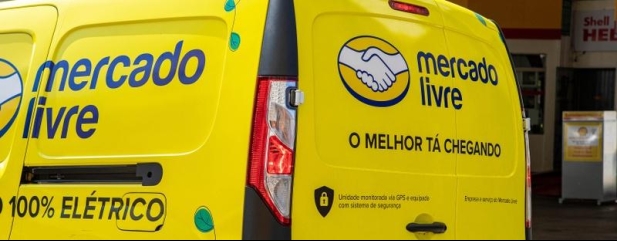Archived article
Please note that tax, investment, pension and ISA rules can change and the information and any views contained in this article may now be inaccurate.
MercadoLibre’s opportunity in democratising banking across Latin America

Mercadolibre (MELI:NASDAQ) $1,528.95
Market cap: $77.5 billion
Readers that have come across MercadoLibre (MELI:NASDAQ) before will likely be familiar with the badge some pin on it – the ‘Amazon (AMZN:NASDAQ) of Latin America’. And just like its US peer, the Uruguay-based business has spent the past couple of decades emerging as one of the region’s ecommerce leaders.
It may have started out as a marketplace for selling second-hand bikes and clothing, and it is today Latin America’s largest online platform, but its ambition is to become the de facto digital bank in a region where millions remain either ‘unbanked’ completely, or are poorly served by local financial institutions, instead relying on relatively expensive money orders, payday loans and other alternatives for access to credit.
According to data, about 4% of the UK population have no bank account, yet in Latin America that figure jumps significantly to nearly 20%, or approximately 122 million people. Some nations are far higher, with ‘unbanked’ figures hitting an estimated 43% in Peru, 40% in Colombia and 28% in Argentina, and even the relatively developed economies of Chile and Brazil have 13% and 16% figures.
WHAT’S THE OPPORTUNITY?
MercadoLibre’s mission is to ‘democratise commerce and financial access’, lending responsibly to consumers, entrepreneurs, and small-to-medium-sized enterprises, and providing digital payments and other financial services.
Many of the senior management have been in place right from the start, with chief executive Marcos Galperin one of the founders, while finance chief Pedro Arnt joined in 1999, its founding year.
They have done a fine job growing the business. In 2023, MercadoLibre reported its third year straight of net profit, topping $987 million on $14.5 billion revenue. That’s a 10-fold jump in income in just five years.
Chiming with its opportunity, multiple growth metrics are still expanding. On a year-on-year basis, gross merchandise volume, total payment volume, and unique active users all accelerated in currency-neutral terms over the past year, to 80%, 153% and 49% respectively.
Its three largest markets, Brazil, Mexico, and Argentina, continued to grow rapidly amid tough macro challenges and inflationary headwinds. Its digital payments platform, Mercado Pago, which processes payments for its marketplace as well as third-party businesses, also set a fresh record of 50 million active users in a single quarter.
Today, MercadoLibre’s online marketplace receives 668 million visits per month. That’s four times Amazon’s traffic in Latin America.
GROWTH AT A REASONABLE PRICE
Yet the shares remain reasonably valued when taking a medium-term view and anticipating rapid growth ahead. By 2025, consensus analyst forecasts point to net profit of close on $2.4 billion on just shy of $21.7 billion revenue. That implies earnings per share of about $47.10, equating to a 2025 price to earnings multiple of around 32.
Return on capital and equity metrics, often a sign of a high-quality business, stand at 27.9% and 40.3% respectively, where scores of 20-plus are usually considered excellent.
Its ecommerce model operating margins, another useful metric, are understandably below other technology stocks, at about 12.3%, according to full year Stockopedia data, yet that is still nearly twice those of Amazon. There is also potential for operating margins to improve as higher margin financial services become a greater part of the revenue mix down the line.
Most recent earnings in February 2024 – for 2023’s fourth quarter – did put a dent in the share price after diluted earnings stayed flat at $3.25 per share and broadly missed the consensus forecast of $7.17 per share. This can be explained by a $351 million in one-time tax charge. Excluding that one-off cost, operating income would have risen 69% year-on-year to $591 million and lifted its operating margin to 13.4%.
MercadoLibre is a high conviction holding of the Scottish Mortgage Investment Trust (SMT), whose Baillie Gifford managers have a long track record for spotting long-run growth winners early. They point out how ecommerce penetration in Latin America has lagged behind other regions due to poor product ranges, long delivery times and high costs.
They believe MercadoLibre solves these problems by providing users with a reliable digital commerce platform, improved logistics and affordable finance, and we share their optimism.
Investors put off by the high share price, which precludes making a more modest investment in the shares directly, could consider looking at Scottish Mortgage as a means of playing the story.
Disclaimer: The author of the article (Steven Frazer) has a personal investment in Scottish Mortgage Investment Trust.
Important information:
These articles are provided by Shares magazine which is published by AJ Bell Media, a part of AJ Bell. Shares is not written by AJ Bell.
Shares is provided for your general information and use and is not a personal recommendation to invest. It is not intended to be relied upon by you in making or not making any investment decisions. The investments referred to in these articles will not be suitable for all investors. If in doubt please seek appropriate independent financial advice.
Investors acting on the information in these articles do so at their own risk and AJ Bell Media and its staff do not accept liability for losses suffered by investors as a result of their investment decisions.
 magazine
magazine








